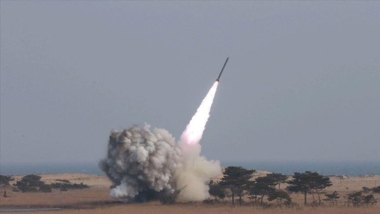
LONDON Jan 14. 2024 (Saba) - A lengthy report in the British magazine "The Economist" revealed the effects of the US-UK attacks on Yemen a few days ago... considering that they will increase the power of Yemen, because they have turned it into a force in a conflict with global powers, led by America, Britain, "Israel" and several Western countries.
The report said: Since last October, “the Sanaa government has been able to put itself in conflict with the most powerful power in the Middle East and the world’s superpower,” questioning whether the strikes against Yemen would be effective in deterring them from targeting Zionist ships.
The report stressed that skepticism about the effectiveness of the strikes stems from the fact that the Sanaa government “has previously proven its ability to withstand a Saudi-led military coalition that has invaded the country since March 2015.”
The report stated that “at the time, Saudi officials believed that they could end the war in six weeks, but after nine years have passed, it has turned into them still trying to extricate themselves from the Yemeni quagmire.” Noting that “Saudi Arabia mostly fought from the top, and the strikes proved "The air force is ineffective in weakening Yemen."
The report concluded, despite its bias in favor of the Western coalition against Yemen, that it is unlikely that Yemen, which has emerged stronger from a nine-year war, will be deterred by a few coalition raids.
According to the report, over the past decade, the Yemeni armed forces have been equipped with a diverse stock of anti-ship missiles, including the “Pavee” missile with a range of 800 kilometers, and they now operate up to six different types of anti-ship cruise missiles, and six other types of anti-ship ballistic missiles, according to a study conducted by Fabian Henze of the International Institute for Strategic Studies.
The report noted that "Western warnings and leaks in the press gave the Yemenis weeks to disperse and hide their weapons, many of which are relatively small and mobile, and it is unclear how much of this arsenal survived the bombing."
The report noted that “if the arsenal remains largely intact, the Yemenis will be able to continue as before, or fulfill their promise to expand the campaign.” Stating that, “In the long term, Sana’a will be able to replenish its stock and import new dismantled missile systems - anti-ship missiles can be dismantled with relative ease.”
On the other hand, The Economist newspaper suggested that the conflict with the West “will have other benefits for Yemen, as their siege of Israel has gained them new admiration throughout the Arab world, where they have benefited from pro-Palestinian sentiment, while the Arab countries stand helpless spectators in the face of the war in Gaza.” ".
The report estimated that “the targeting of Yemeni forces by the United States, while hostility to Washington is escalating due to Biden’s support for Israel, will increase their popularity.”
Also, this could also strengthen their position in peace talks with Saudi Arabia, according to the report’s analysis.
The report pointed out that "a few years ago, the Saudis might have cheered the Western strikes on Yemen, but today they are in a critical position, calling for calm for fear that Yemen will decide to expand its campaign by targeting the Gulf states with missiles or drones, as they did hundreds of times during the war nine years ago."
The report considered that "the events of the past two months will reinforce to the Saudis why they want to reach an agreement and end their war with Sana'a, even if that leaves the Ansar Allah Movement as the dominant force in Yemen."
The report stressed that Washington "does not want to be drawn into another long conflict in the Middle East, while Sana'a has no such concerns, as its forces held out more against the forces of the former president, who waged a series of brutal campaigns against them, and they exhausted the Saudi-led coalition." . Considering that they are now "undoubtedly pleased that they have attracted Washington into its open process."
E.M
resource : Saba